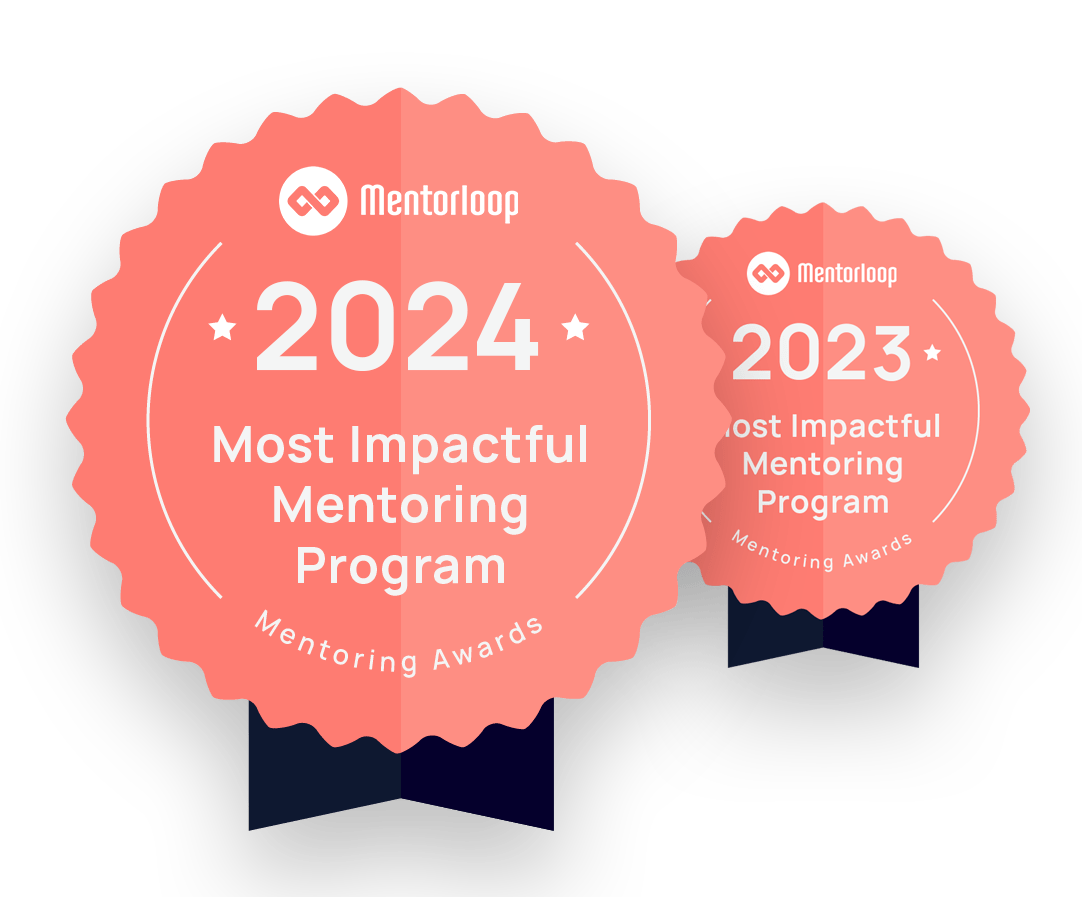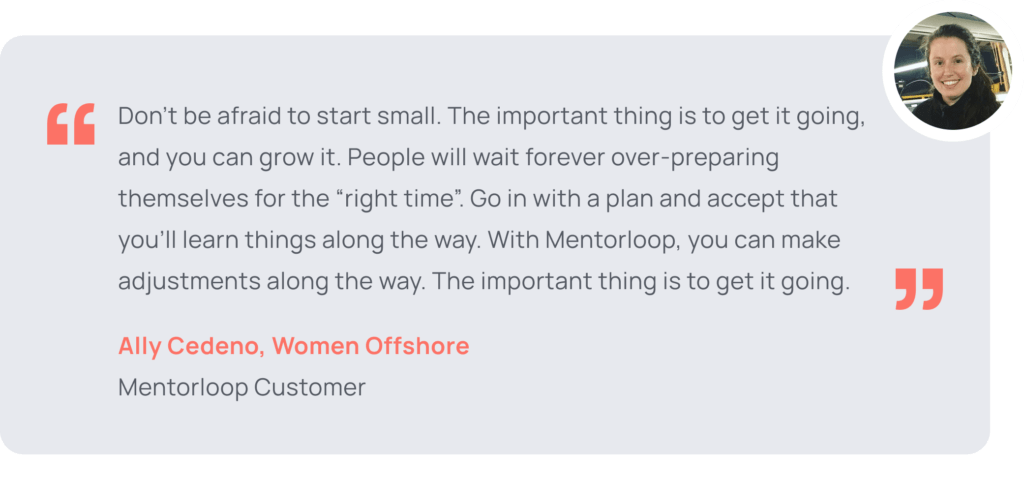
How Grant Thornton is Shaping the Future of Employee Development and Inclusion
with Michelle Murphy and Klara Murphy
Mentoring Team at Grant Thornton

with Michelle Murphy and Klara Murphy
Mentoring Team at Grant Thornton

Before engaging with Mentorloop, we faced several challenges in setting up a firm-wide mentoring program. Mentoring was previously conducted informally within smaller teams and lacked structure, tracking, and meaningful feedback. Additionally, as a client-facing organization, our employees often work on different teams in various locations, making it difficult to connect with potential mentors outside their immediate departments.
We also recognized that setting up a formal mentoring program would place a heavy administrative burden on our program coordinator. It would require significant time to determine who wanted to be mentored, who would make good mentors, and how to match them. Without a comprehensive system, our coordinators would have had to rely on personal knowledge of the applicants or spend hours reviewing bios. Tracking the effectiveness of the mentorship relationships would have added even more complexity, making it hard to gather useful feedback and measure the program’s success.
Lastly, there was a lack of awareness about mentoring within the organization. Many employees confused mentoring with coaching or day-to-day management, and it wasn’t always clear what a proper mentoring relationship should involve.
Since launching our mentoring program with Mentorloop, we’ve seen a transformative impact across the organization. In our 2023 training needs analysis survey, 87% of respondents rated our development opportunities, including the mentoring program, as either excellent or great.
One of the key shifts has been the way employees now view mentorship as a crucial part of their career development, rather than relying solely on their immediate managers. The program has fostered greater cross-firm collaboration, with mentees being encouraged to seek mentors outside their departments. This has led to more engagement and interaction across the firm, especially at organization-wide events.
There have been tangible career benefits as well. Four of our current Partners were involved in the mentoring program as directors. In our most recent promotion cycle, 17% of those promoted had participated in the mentoring program, either as mentors or mentees. With 10-12% of our employees involved in active mentorships at any given time, these results are particularly noteworthy and highlight the program’s effectiveness.
Initially, we piloted the mentoring program with middle management and then expanded it to senior levels after seeing its success. An internal survey showed us that junior employees also wanted access to mentoring, so in 2022, we opened the program to all levels within Grant Thornton Ireland.
To ensure equal access, we established guidelines to help participants identify appropriate mentors based on their career stage. For example, while many might want a partner as a mentor, we guide employees to look for mentors at the right level to ensure all levels have access to senior mentors.
We’ve also made the program accessible across all nine of our offices, including locations in Ireland, Bermuda, Isle of Man, and Gibraltar. Information about the mentoring program is displayed on our internal screens and SharePoint platform, with resources for training, guidelines, and mentoring details readily available. Additionally, we use a yearly awareness campaign to promote the program, ensuring that it’s visible and accessible to all employees.
Mentoring is embedded in the culture at Grant Thornton, and we’re dedicated to continuing its growth. We have natural advocates across all levels of the firm, which has been crucial to the program’s success. Using Mentorloop resources, we’ve developed training sessions for both mentees and mentors, ensuring everyone gets the most out of their mentoring relationships.
Mentoring is a consistent feature in our bi-monthly newsletter, helping employees stay informed about upcoming training sessions and available resources. We also anonymize sentiment data to highlight the authentic connections being built through the program, which keeps the human element at the forefront of our mentoring culture.
Our goal is to keep fostering these connections and embedding a strong mentoring culture within Grant Thornton for years to come.
We have experienced great success with our mentoring program and plan to continue expanding it in the future. We launched a pilot reverse mentoring program between partners and trainees, and are considering launching this at scale.
We’re also looking to formally integrate mentoring into our female talent programs. We believe adding mentoring will enhance these programs, providing an additional layer of guidance and support.
Additionally, we’re working closely with our Head of Equity, Diversity, and Inclusion to ensure that mentoring helps foster an inclusive workplace and that everyone has access to a mentor. Our goal for next year is to increase overall participation in the program from 10-12% of our employee base to 15-20%, which we are confident we can achieve as we continue to add more available mentors.

Mentoring Programme Coordinator at Grant Thornton

L&D Assistant Manager at Grant Thornton
Share this Article
Join the loop

We have a really strong mentoring culture embedded in Grant Thornton and really want to keep going with it. We have so many natural advocates across all different levels in the firm which has been so helpful for growing the programme.
– Klara Murphy, Mentoring Programme Coordinator at Grant Thornton Ireland

What Role Does Equity and Equality Play in Your Mentoring Program?
The right mentoring program should level the playing field to empower entire cohorts of people: workplaces, member associations, social groups and educational institutions. Equality should be a cherished value so that every individual can thrive—whoever they are, whatever their background, however they worship or whomever they love. But we can’t arrive at equality without it’s often forgotten partner, equity.

What does a Mentoring Program Coordinator do?
Being a Mentoring Program Coordinator is an incredibly rewarding experience that positively impacts the lives of many. And while mentoring programs don’t fully run themselves (even though Mentorloop can do a great deal of the heavy lifting!), they do require a point of contact that can steer the program in the right direction for the organisation that is running one.

Building Quality Feedback Into Mentoring Relationships
This is Part 8 of our 10-part series on the 10 Key Qualities and Habits of a Highly Effective Mentor.
In this post, we’ll look at how mentors can successfully build quality feedback into their mentoring. Quality feedback is priceless because it clarifies expectations, helps people learn from their mistakes, and builds confidence. It also allows mentees to more effectively take what their mentors say and turn it into action.

